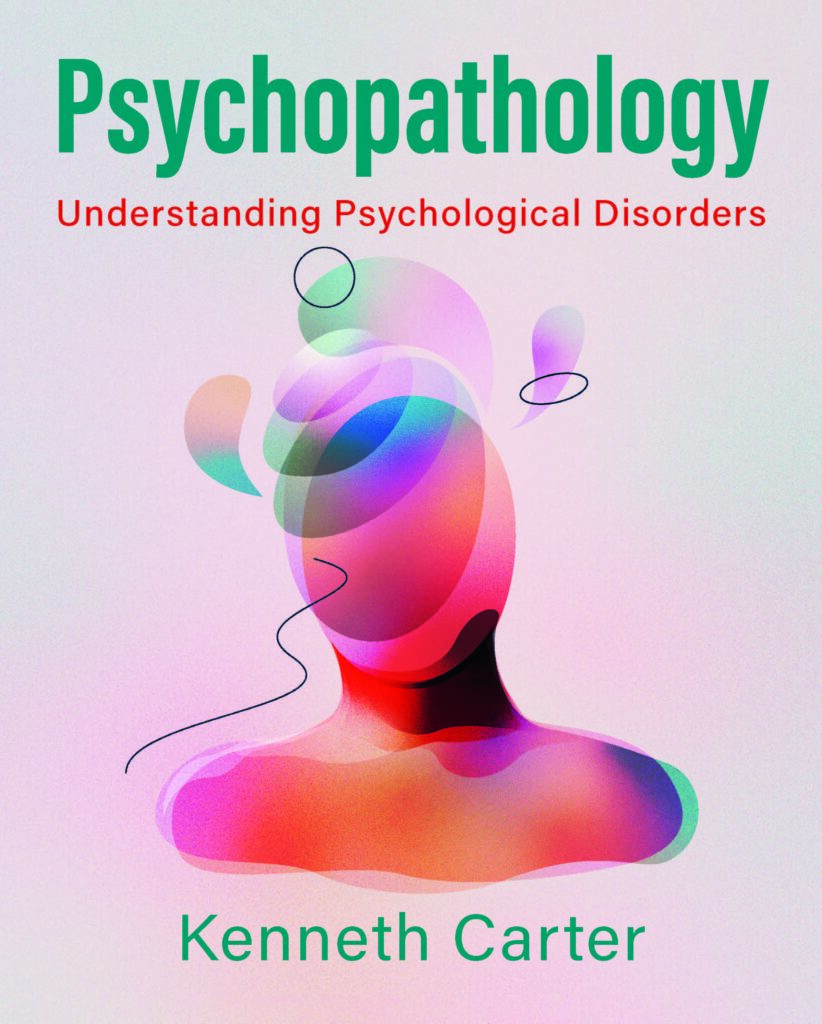

Dr. Ken Carter, author of Psychopathology, sat down with Cambridge University Press marketing associate, Victoria Wenke, to discuss the building of his textbook and the unique involvement of his students in the development of the book.
Victoria Wenke: Hello Dr. Carter. Thank you so much for meeting with me. You’ve been a professor in the field of psychology, specifically psychopathology, for some time now. What inspired you to want to write a textbook?
Kenneth Carter: Thanks so much. It’s an honor to talk to you about this project. I’ve been teaching classes in psychological disorders for over 20 years now. I’ve always had a passion for diagnosis and treatment and being able to help people understand the various theories and methods.
When I started teaching my career at Oxford College, I mostly taught Introductory Psychology. The department asked me what others courses I might be interested in bringing to Oxford, and I didn’t miss a beat with naming psychological disorders or psychopathology, which is the clinical term.
From that time since, choosing a textbook has been difficult. Many textbooks are quite clinical and dense, and few incorporated the impact of culture and environment. Plus, how the field of psychology conceptualizes conditions has changed over time. There wasn’t one book that focused on what I was teaching or the ways I was teaching.
When I finally started thinking about writing my own textbook, I knew I wanted it to be flexible. It needed to cover the Diagnostic and Statistical Manual (DSM) diagnoses, and also incorporate structural, environmental, and cultural factors that influence psychological conditions. I also wanted the book to connect with students.
It was a tall order to bring all those elements together, but that was my goal. I also wanted a book that was flexible and organized. There are so many ways to teach this course, and a structured predictable format allows faculty to teach the content that’s most important for them, and for students to find the information they need. For example, if you only teach the disorders but not the treatments, it should be easy to assign the readings that are most relevant for your course.
VW: That’s one thing since starting to work at CUP and in textbook publishing, that I’ve learned. A lot of authors take that approach with making their textbook accessible to different teaching methods. The flexible format, a sort of a la cart model, allows lecturers the ability to customize their course. It’s interesting to learn how early on that idea comes into play and how it shapes the creation of the book. I was an English major in university and even while reading novels, I had professors who would assign only the first half of the book, or a few select chapters. Clearly this mode of organization is quite common among various disciplines.
I wanted to add that oftentimes you hear from writers, mostly for fiction, that they wrote the book they wanted to read. Do you think that could be true for you and Psychopathology? Did you write the textbook you wanted to teach from?
KC: Yes, 100%. I couldn’t wait to start using it, which is one of the reasons why I involved my students in the project. This book reflects the way that I teach.
The 20+ years of teaching psychological disorders has influenced what this book has become. It reveals the passion I have about having my students understand the disorders from a personal perspective – the perspective of the client – because some of them will experience these conditions either themselves or through family and friends.
It’s not only the book that I wanted to exist, but I couldn’t wait to start teaching from it. The only disadvantage is now all the examples I usually give in class are in the book. Sometimes, when I forget this, I’ll start a case and a student will finish it.
VW: You mentioned involving your students in the process of creating the textbook. Can you talk more about how you involved them and why that was important to you?
KC: For those not familiar with the review process for textbooks, the book is reviewed by other scholars for accuracy and to make sure it would be useful for the classroom. While faculty adopt textbooks, the students will use it, and I thought, the review process should include them as well.
Sometimes I assume my students are like me when I was 18 years old. But they’re not. Their experiences are different; their language and cultures are different. So, I wanted to make sure my students were reading a book written for them, with them in mind.
I grouped the students into teams of five. Each group would read a chapter and make annotations in the draft–What’s interesting to you, what doesn’t make sense, what resonates with you, and so forth. Then I’d scramble the groups and have them do the next chapter, and so on.
The feedback was amazing! The only problem was that I couldn’t get them to stop. I had asked for 5-10 annotations per chapter, but I was getting well over that. They were giving me great feedback.
I even had one student who wanted to read the whole book, including the annotations from every group, and summarize the feedback. We devised a special project around this and together we were able to go through and see where the book was really resonating with students and where it wasn’t.
Of course, compiling feedback from subject experts, those who teach the courses, is essential to getting the science right and ensuring that the book will be accessible to their classroom, but my students added a unique and critical lens that would have otherwise been overlooked. We also worked with Dr. Leslie Berntsen to review the book from a sensitivity lens. This extra review step is one most textbooks don’t usually take. It was important to me to get the language right, especially around psychological disorders.
VW: Wow, I think that’s a true testament to you as a teacher, that the students became excited about their involvement. You often hear teachers talk about what it means to them when they see the difference they’ve made in a student’s life.
From my own experience as a college student, I know it’s not always easy to get young people engaged. It’s really incredible to see how on board your class was, and again, reveals just how wonderful of a teacher you must be to have inspired them to not only do their assignment, but to really become invested in the project with you.
KC: Yes, they were so helpful. They really took it on as a personal project because they knew the book was going to become better with their help and influence how other people might be reading it once published. It was also a fun way to have the students learn the course material.
This practical application helps with learning as opposed to only receiving a theoretical understanding. Students learned in a deeper way because they’re truly engaging with the material. They are a part of their own learning process.
VW: Involving students can be incredibly rewarding and meaningful to them since young people can tend to feel intimidated within professional settings due to their age and limited experience. It’s really cool that you invited the students to help and gave them this platform where their voices were appreciated and actually highly beneficial to the success of the textbook.
KC: It was great for me too. I remember using an example of a Tupperware party and none of the students knew what I meant by that. Their help made me realize that there were certain anecdotes that no longer worked because they were no longer relevant.
VW: That kind of leads into my next question. Since you have been teaching for 20+ years how have you seen the teaching of this subject change over the years? Especially since today is much more media focused, there’s a lot you can do to engage students with video and media content.
KC: I feel like the essentials are the same, and I think what students want, especially from this discipline within psychology, is to understand themselves, other people, and the story behind the research. The difference is that there are new tools to illustrate these stories, and sometimes to show them in real life. I’ve always found it helpful to use real case studies whenever I can.
I find autobiographies or documentaries in which people discussed their experience with psychological disorders and included those within the textbook. The advantage is you can read a section in the book and, if interested, do a deeper dive, and read or watch the entire piece. I even encourage my students to do their own scavenger hunts where, with certain key terms, they search and find other real-world examples.
VW: It’s all very exciting that now, the book having been published in December, you get to teach from the book you wished was out there.
KC: I am so excited for the book to get into people’s hands. I couldn’t be happier. I appreciate all the support from Cambridge.
VW: That’s so lovely. I was going to comment too that it must be pretty cool for students to see their textbook and think, “my professor wrote this, and I helped!”

Psychopathology is available now. The textbook is an accessible, engaging, and well-organized text covering the study, understanding, diagnosis, treatment, and prevention of psychological disorders. Fully integrating gender and culture in the presentation of mental disorders and using a sensitive and inclusive language to encourage an empathic approach to psychopathology, this introductory textbook offers students a strong foundation of the socio-cultural factors influencing how we treat mental disorders. Learn more here.
Latest Comments
Have your say!